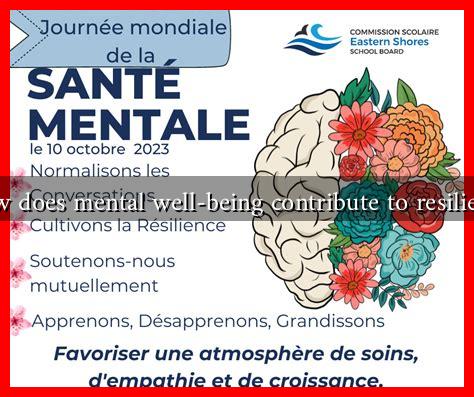-
Table of Contents
How Does Mental Well-Being Contribute to Resilience?
Mental well-being and resilience are two interconnected concepts that play a crucial role in how individuals navigate life’s challenges. Resilience is often defined as the ability to bounce back from adversity, trauma, or stress, while mental well-being encompasses emotional, psychological, and social health. Understanding the relationship between these two elements can provide valuable insights into personal development and coping strategies.
The Foundation of Mental Well-Being
Mental well-being is not merely the absence of mental illness; it is a state of positive mental health that allows individuals to thrive. Key components of mental well-being include:
- Emotional Regulation: The ability to manage emotions effectively.
- Self-Awareness: Understanding one’s thoughts, feelings, and behaviors.
- Social Connections: Building and maintaining healthy relationships.
- Purpose and Meaning: Having goals and a sense of direction in life.
Research indicates that individuals with high levels of mental well-being are better equipped to handle stress and adversity. A study published in the journal Psychological Science found that individuals with positive mental health are more likely to exhibit resilience in the face of challenges.
The Role of Resilience in Coping with Adversity
Resilience is not an inherent trait but rather a set of skills that can be developed over time. It involves a combination of cognitive, emotional, and behavioral strategies that help individuals cope with stress. Some key aspects of resilience include:
- Adaptability: The ability to adjust to new circumstances.
- Problem-Solving Skills: Finding solutions to challenges.
- Optimism: Maintaining a positive outlook even in difficult situations.
- Support Systems: Relying on friends, family, and community for support.
For instance, a case study involving survivors of natural disasters showed that those with strong mental well-being were more likely to rebuild their lives and communities effectively. They utilized their emotional regulation skills to cope with loss and grief, demonstrating that mental well-being directly influences resilience.
Statistics Highlighting the Connection
Several studies underscore the link between mental well-being and resilience:
- A survey conducted by the World Health Organization found that individuals with higher mental well-being scores reported lower levels of stress and anxiety.
- Research from the American Psychological Association indicates that resilient individuals are more likely to engage in healthy coping mechanisms, such as exercise and mindfulness.
Strategies to Enhance Mental Well-Being and Resilience
Improving mental well-being can significantly enhance resilience. Here are some effective strategies:
- Mindfulness and Meditation: Practicing mindfulness can help individuals stay grounded and manage stress.
- Physical Activity: Regular exercise is linked to improved mood and mental health.
- Social Engagement: Building strong relationships can provide emotional support during tough times.
- Professional Help: Seeking therapy or counseling can provide tools to enhance mental well-being.
Conclusion
The relationship between mental well-being and resilience is profound and multifaceted. Individuals who cultivate their mental health are better equipped to face life’s challenges, adapt to change, and recover from setbacks. By understanding and enhancing mental well-being, we can foster resilience, enabling us to lead more fulfilling lives. As we navigate an increasingly complex world, prioritizing mental health is not just beneficial; it is essential for personal growth and community well-being.

